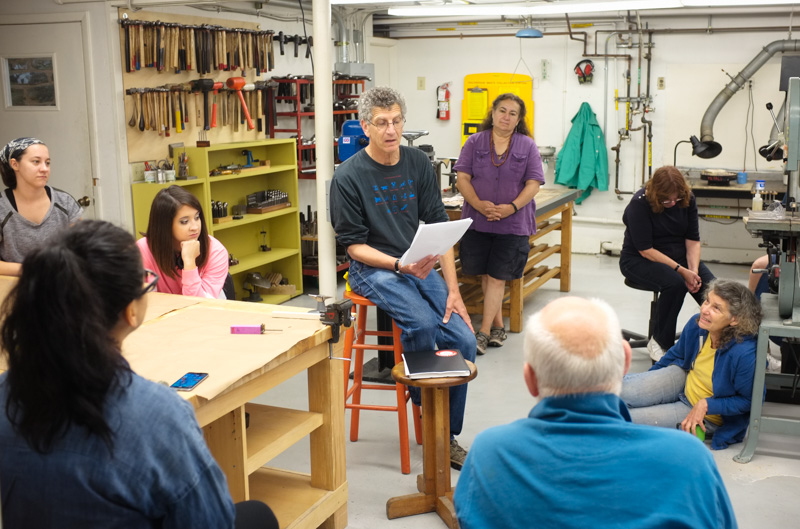Stuart Kestenbaum spent two weeks at Penland in July as this year’s Andrew Glasgow Writing Resident. Stuart is the author of four books of poetry and a book of essays on craft and creativity. His work has been published in a number of magazines including Tikkun and The Sun and has been featured on Garrison Keillor’s The Writer’s Almanac. He sent us this account from his time at Penland. Scroll to the bottom to see a video of Stuart reading a couple of poems.

During my last week of the job I had held for 27 years, I received a call from Penland’s program director Leslie Noell asking me to be the Andrew Glasgow Visiting Writer at Penland for a two-week summer session. Sometimes before picking up a ringing phone I reflect for a moment that it could be either a wonderful opportunity or really bad news. Most times the call is far more mundane than that– a reminder of a dental appointment or a robo-call from a nonexistent bank. The call from Penland, though, was of the rare wonderful opportunity variety, particularly since the job I was leaving was as director of the Haystack Mountain School of Crafts, a program in Maine so similar in concept to Penland that we think of ourselves as sister schools. Penland inspired the founding of Haystack in 1950, and Bill Brown, who was assistant director at Haystack, became director of Penland in 1962. We’ve been sharing faculty and educational strategies for a long time.
At Penland I would be able to experience the powerful creative energy of a community of makers—much like what I’d lived with at Haystack—but without any of the responsibility. Someone else would be thinking about plumbing, food, kilns, and fundraising. And, while I always loved the group energy of each session at Haystack, there was rarely time for my own work; these two weeks at Penland would give me time to focus on my writing.
A number of the workshop leaders—Bob Ebendorf, Jason Pollen, and Patricia Wheeler—had all taught at Haystack, so I had connections with the studios from the very start of the session. At Haystack I would introduce evening program by reading other people’s poems, so Bob invited me into his workshop to read poems to his class in the mornings. He said that I was like a tinker, traveling to the studio with poetry. I responded by saying that I would be more like a tinker if people gave me words that I could turn into a poem—repairing them or giving them new life in a sense. I would be a tinker of words. This began a series of daily poems with words from Bob’s class and later words from Kip O’Krongly’s clay class too.
It was liberating for me to use words that weren’t of my own choosing and exciting for the people in the studios to see their own words transformed. Each morning I’d return with a poem from the day before—some a little crazier than others—but the writing had allowed me make discoveries. And isn’t that what we want from our making? To employ what skills we have to travel along an unknown path into a new place. Using other people’s words provided me some distance from my writing self and allowed me to go inside more deeply, or at least differently. When the clay group left me a list of sixteen words (marsupial, mountain, basket, cleft, immense, bacon, pattern, noodle, anxiety, rigor mortis, stoicism, applesauce, stressed, passion, silhouette, and bedfellows) here’s what I wrote.
Hermit’s Dream
Living on the mountaintop, I missed
coffee and bacon at first—who doesn’t?
and later began to dream of simple things like
applesauce and noodles, since I was living
on air. Passion takes many forms,
my master had always stressed.
Look for patterns he said.
Being and non-being are strange
bedfellows. One day anxiety left me, drifting
off and settling in a rock cleft far below.
When the light was right, I could watch
its silhouette moving wildly.
I learned the names of my fears
and put them in a basket. Each day I would
climb the ledges, remembering who I
had been, feeling like a marsupial carrying
all those personalities in my pouch.
Then there was nothing. But it’s not what we
fear. No rigor mortis. I was alive and
dancing in this immense emptiness that
is everything. Stoics were laughing. Birds
were singing. First morning.
It was a dynamic partnership with the studios that I would look forward to each day. I’d receive my list of words in the late afternoon and work on the poems at night, ready for delivery to the workshops in the morning. I had my materials and I had a deadline—two key components of any creative process—and people eager to listen to poetry. What more could a writer want?
–Stuart Kestenbaum, September 2015
Here’s an excerpt from Stuart’s reading at Penland.
Stuart’s only complaint about his time at Penland was that, for some reason, nobody was playing frisbee or volleyball that session. He left us this poetic visual comment.

